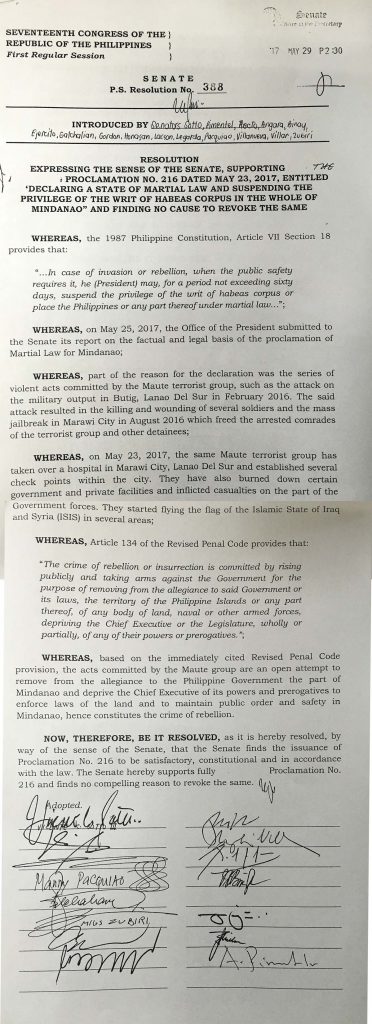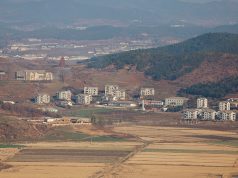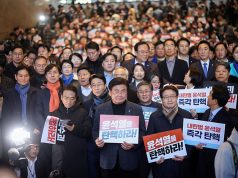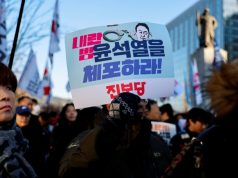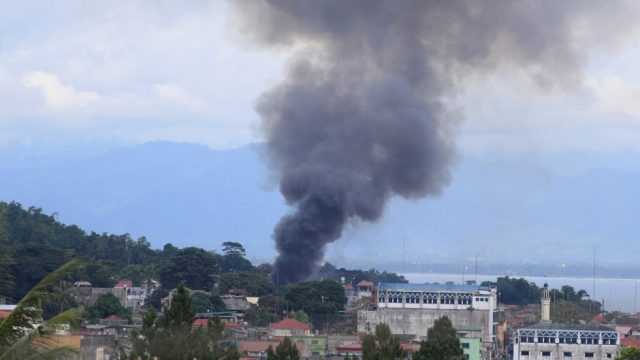
MANILA, Philippines — Fifteen of the now 23-member Senate have signed a resolution finding “the issuance of Proclamation No. 216,” though which President Rodrigo Duterte placed the whole of Mindanao under martial law, “satisfactory, constitutional and in accordance with the law.”
In the House of Representatives, meanwhile, members of the Makabayan bloc have filed a joint resolution calling for a joint session of Congress in joint “in accordance with Article VII, Sec. 18 of the 1987 Constitution and to revoke Proclamation No. 216, Series of 2017” calling many of the bases laid down by Duterte for declaring martial law “inaccurate, grossly exaggerated or outright false.”
Senate Resolution 388 “finds no compelling reason to revoke” the martial law declaration. It was signed by:
- Senate President Aquilino Pimentel III
- President Pro-Tempore Ralph Recto
- Majority Leader Vicente Sotto III
- Juan Edgardo Angara
- Maria Lourdes “Nancy” Binay
- Joseph Victor Ejercito
- Sherwin Gatchalian
- Richard Gordon
- Gregorio Honasan
- Panfilo Lacson
- Loren Legarda
- Emmanuel Pacquiao
- Joel Villanueva
- Cynthia Villar
- Juan Miguel Zubiri
Those who did not sign the resolution are:
- Franklin Drilon
- Paolo Benigno Aquino IV
- Leila de Lima
- Francis Escudero
- Risa Hontiveros
- Francis Pangilinan
- Grace Po
- Antonio Trillanes IV
However, although a majority of senators have voiced support for martial law, this does not mean they cannot call for a joint session of Congress.
Some members of the Senate majority such as Recto and Ejercito have said they prefer a joint session so the bases and the details of the martial law proclamation can be discussed publicly.
Recto said he was “supporting the President’s declaration and likewise, support the need for a joint session as a matter of procedure.”
“I expect a sizable majority to support the President,” he added. “A good majority supporting the president in joint session will give the president and our security forces an overwhelming mandate from the people’s representatives.”
Meanwhile, Escudero explained he did not sign the resolution because he “didn’t know there was such a resolution. Nobody showed me a copy of the resolution.”
“Anyway, for me such a resolution is superfluous because the Constitution does not require it,” he said. “The issue is not whether or not Congress will confirm ML (martial law) but whether or not Congress will revoke it.”
“I would have voted against revocation at this time in a joint session once a member of Congress files a motion to so revoke,” he said.
Duterte placed the whole of Mindanao under martial law for 60 days starting from May 23, soon after fighting broke out between government forces and the Maute group in Marawi City. Since then, he has hinted of extending both the length and scope of martial law and has also suggested he would ignore the Supreme Court or Congress should either of the two other branches of government decide against his declaration.
On May 25, Duterte submitted to Congress his report laying down the factual and legal bases for his martial law declaration.
Resolution 388 agreed with the reasons Duterte laid down, including last year’s fighting in Butig and mass jailbreak in Marawi, and the occupation or torching of government and private facilities as well as the flying of flags of the Islamic State of Iraq and Syria on May 23.
These acts, it said, fell within the purview of Article 134 of the Revised Penal Code that defines rebellion or insurrection as “rising publicly and taking arms against the government for the purpose of removing from the allegiance to said government or its laws, the territory of the Philippine Islands or any part thereof, of any body of land, naval or other armed forces, depriving the Chief Executive or the Legislature, wholly or partially, of any of their powers and prerogatives.”
But the Makabayan bloc, composed of Representatives Carlos Isagani Zarate of Bayan Muna, Antonio Tinio and France Castro of ACT Teachers, Emmi de Jesus and Arlene Brosas of Gabriela Women’s, Ariel Casilao of Anakpawis, and Sarah Jane Elago of Kabataan, noted that Duterte, who was in Russia then, declared martial law even if the Armed Forces had declared Marawi stabilized and security forces “in full control of the situation.”
The activist lawmakers also said “a review of the President’s Report to Congress would reveal the inaccuracy, exaggeration and/or falsity” of many of the events he cited to justify martial law, singling out the “glaring example” of Duterte’s claim on returning from Russia that he chief of police of Malabang town had been beheaded only to have the officer himself refute this later.
“The declaration of martial law throughout Mindanao is bereft of factual basis; it is unwarranted, unjustifiable, and wholly out of proportion to the threat posed by the Maute group and ASG (Abu Sayyaf Group),” the resolution said as it noted that past administrations “were able to quell terrorist actions or armed confrontations of similar and even bigger groups without resorting to the extraordinary power of martial law.”
It added that the events in Marawi that have been established, such as the clashes between the Maute group and government forces, the burning of schools and the Marawi cathedral, and the setting up of checkpoints “in no way constitute rebellion that warrants the imposition of martial law.”
The resolution said Duterte’s proclamation “strangely asserted an unsupported allegation against ‘other rebel groups’,” and “concluded that the … May 23, 2017 attack supposedly ‘shows the capability of the Maute group and other rebel groups to sow terror, and cause death and damage to property not only in Lanao del Sur but also in other parts of Mindanao’.”
But, it stressed, this was a conclusion “bereft of factual and logical basis, considering that the whole of Mindanao is comprised of 27 cities and 422 municipalities” and the Maute group “could not, and in fact they did not, sow terror, cause death and damage to property to such a large area.”
It added that “the mere indication of capacity, or even actual capacity ‘to sow terror, and cause death and damage to property,’ is not equivalent to the existence of actual rebellion or invasion, and thus there is no factual basis to declare a state of martial law.”
The Makabayan bloc also called Proclamation 216 “overbroad and dangerously vague,” especially when mentioning “other rebel groups,” thus opening it up to “broad interpretation, misinterpretation, and confusion, with incalculable adverse consequences to (the) lives, limbs and civil liberties of our people” even as it “falsely and illegitimately raises the level of terrorists and bandits like the Abu Sayyaf to the level of a rebel group when government has in fact labeled them as mere bandit groups.”
It warned that “left unchallenged, the imposition of a state of martial law in Mindanao could just be a prelude to similar declarations of military rule in other parts of, or the entire country, in the immediate future” and reminded Congress of “the grave human rights violations during Marcos’s martial law.”
